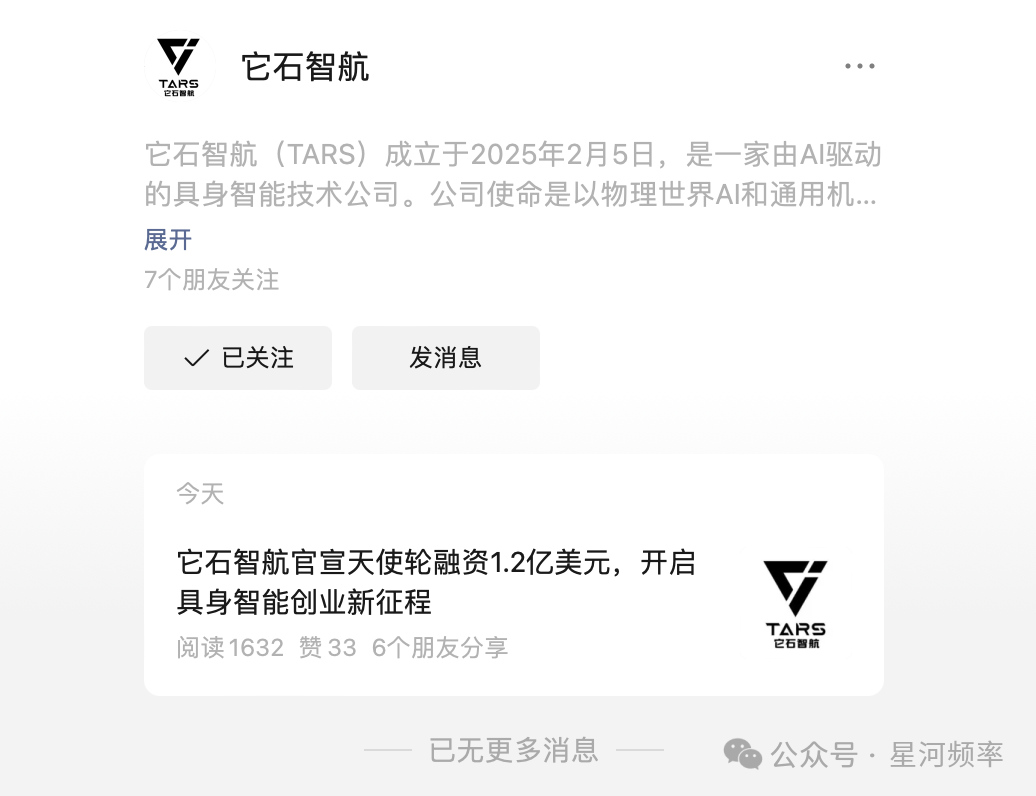Embodied AI player raises over 800 million yuan in funding, showing exceptional strength
![]() 03/26 2025
03/26 2025
![]() 877
877

Author | Xiang Xin, Bai Xue
$120 million, equivalent to approximately 860 million yuan.
Tashi Zhihang, an embodied intelligence startup, has set a record for the largest angel round funding in China's embodied intelligence sector. This funding will primarily be used for product and technology research and development, model training, scenario expansion, and other directions at Tashi Zhihang.
Tashi Zhihang was officially founded on February 5th of this year, and it took only two months for the founding team to secure the largest angel round funding in the industry.
The most important reason is that its founding team can be described as a "double-edged sword" in the autonomous driving industry.

Li Zhenyu is a representative of L4 Robotaxi, once serving as President of Baidu's Intelligent Driving Group, leading the development of the Apollo autonomous driving open platform and "Luobo Kuaipao".
Chen Yilun, on the other hand, is a representative of L2 intelligent driving, once hailed as the "soul figure" of Huawei's intelligent driving R&D team and served as the Chief Scientist of Intelligent Robotics at Tsinghua University's Institute for Intelligent Industries.
The two have joined forces to establish Tashi Zhihang, which is by far the most luxurious founder lineup in the embodied intelligence industry. Currently, Tashi Zhihang is actively recruiting a large number of R&D positions.
Securing $120 million is just the beginning.
Chen Yilun introduced that Tashi Zhihang will focus on physical world AI and general robotics technology to build a reliable super embodied intelligent system.

Setting a record for the largest angel round funding in the industry
$120 million is a significant amount of money for early-stage investment and financing.
Figure AI, the world's most highly valued humanoid robot company, received $70 million in Series A funding from 10 investors including Aliya Capital Partners during its initial round of funding.
The value of securing $120 million in angel round funding speaks for itself.
The reason why the first round of funding is called the angel round is that it is the first batch of startup funds used by enterprises to gather core members. The amount is not too large, generally concentrated between $1 million and $5 million, and there is little public data available.
Raising over $100 million in the angel round can basically be judged as Tashi Zhihang being "snapped up" by investment institutions.
Tashi Zhihang's angel round was co-led by BlueRun Ventures and Qiming Venture Partners, with participation from Linear Venture, Everbright Sun Hung Kai Capital, Hongtai Fund, Legend Capital, Xianghe Capital, and Hillhouse Capital.
The two lead investors have invested in companies like Li Auto and Darkside of the Moon, and one of them created an investment myth by earning 866 times the initial investment of $5 million in Xiaomi.
Therefore, Tashi Zhihang's investment lineup is equivalent to a combination of lead investments from professional early-stage investors in China and follow-on investments from popular investment "giants".
In addition to valuing the founding team, these investment institutions have also mentioned Tashi Zhihang's "full-stack AI capabilities and engineering capabilities".
For the popular but early-stage embodied intelligence industry, it is common to see two or three companies announce their establishment within a week.
However, Tashi Zhihang is the first to announce over $100 million in angel round funding with its initial announcement.

The core is that their experience in autonomous driving will become a deeper engineering and implementation capability for this group.
Yu Kai, the founder of Horizon Robotics, believes that "the biggest difference between robots and autonomous driving is that data collection is very easy in autonomous driving, with massive amounts of data available, while robots have no data".
Tashi Zhihang seems to have found a solution, and currently has released two core technological advancements:
It has created a Human-Centric embodied data engine, achieving a leapfrog breakthrough in the ability to acquire embodied data in the real world.
It is the first in the industry to develop an integrated embodied large model for spatial perception and reasoning decision-making, accelerating the GPT moment of embodied intelligence technology development by creating a data-driven, generalizable intelligent system for the physical world.
This means that Tashi Zhihang has likely found a brand-new methodology.

Led by intelligent driving experts, the team boasts a luxurious lineup
The background of team members is the core decision-making basis for investment institutions investing in startups.
And with $120 million in angel round funding, Tashi Zhihang boasts a "luxurious dream team" in the field of embodied intelligence.
The core members of the team have made outstanding achievements in intelligent driving and artificial intelligence and successfully created star-level AI products.
The core talent team at Tashi Zhihang consists of 5 members, including 1 from Baidu, 3 from Huawei, and 1 who has worked at both:
Chairman Li Zhenyu: Formerly President of Baidu's Intelligent Driving Group, led the development of the Apollo autonomous driving open platform and the world's largest driverless ride-hailing service platform "Luobo Kuaipao", and is a leading figure in China's autonomous driving industry.
CEO Chen Yilun: Formerly Chief Scientist of Intelligent Robotics at Tsinghua University's Institute for Intelligent Industries, CTO of Huawei's autonomous driving division, and Chief Engineer of DJI's machine vision department.
Chief Scientist Ding Wenchao: Former "Genius Youth" at Huawei, led the end-to-end decision-making network for Huawei's intelligent driving from scratch. He is also a researcher at Fudan University's Robotics Research Institute and created Fudan's first humanoid robot.
Chief Architect Chen Tongqing: Formerly Director of Huawei's ADS Intelligent Navigation Department and Chief Technical Expert in Spatial Perception, leading multiple products to successful commercialization. He is also a Ph.D. from Tsinghua University and Chief Scientist of a national major special project.
Chief Strategy Officer Vincent: An expert in multimodal learning, formerly responsible for key technical positions at Huawei and Baidu.
From the resumes of the talent, it can be seen that the Tashi Zhihang team spans both intelligent driving and robotics, possessing both top-notch understanding of cutting-edge technology and rich experience in product commercialization and company operation management.
Among them, Li Zhenyu, Chen Tongqing, and Vincent have stronger capabilities in technology commercialization integration and strategic vision, able to keenly capture market demand and promote the transformation of technological achievements into commercial value.
While Chen Yilun and Ding Wenchao are more purely technical talents, able to focus on tackling complex technical challenges.
Technological research and development and commercialization capabilities are the two most important factors for embodied intelligence companies to break through. Tashi Zhihang has both.

Included in the government work report, embodied intelligence continues to heat up
Tashi Zhihang is one of the epitomes of the global embodied intelligence race's feverishness.
During this year's National Two Sessions, embodied intelligence was written into the government work report for the first time, becoming one of the key industries to be cultivated in the future.
Shenzhen also announced this year that it will invest 10 billion yuan in three key areas, including artificial intelligence and robotics industries, and proposed in its government work plan to cultivate more than 10 embodied intelligence enterprises with a valuation of over 10 billion yuan.
The guidance and encouragement of policies have given the investment market a shot in the arm.
According to incomplete statistics, from January to March of this year (as of March 26th), there were 30 financing events in the global embodied intelligence field, with a cumulative funding amount exceeding 6.9 billion yuan. Among them, there were 25 domestic financing events, with a disclosed total amount of approximately 3.12 billion yuan.
In terms of investment heat and quantity:
The domestic financing style is characterized by a large number of invested enterprises with moderate amounts;
There are fewer invested enterprises abroad, but the amounts are huge, almost all in the hundreds of millions of dollars.
Domestic embodied intelligence belongs to a financing model where everyone benefits equally.
From January to March of this year, financing news has been announced by embodied intelligence-related companies such as Zhuji Power, Vital Power, Xinghaitu, Zhipingfang, Zero-Power Robotics, Zhongqing Robotics, Zhongke Huiling, Zibianliang Robotics, and Zhiyuan Robotics.
These financings have two major characteristics.
First: Most belong to early-stage financing such as seed rounds, angel rounds, and Series A rounds, with funding amounts typically in the tens of millions or hundreds of millions of yuan.
Even in very early-stage financing, multiple companies have surpassed the 100 million yuan funding mark.
Among them, Zhongke Huiling, Vital Power, and Xinghaitu are more representative.
In February of this year, Zhongke Huiling and Xinghaitu successively announced the completion of a 100 million yuan angel round of funding and nearly 300 million yuan Series A round of funding, respectively.
On March 21st, Vital Power announced the completion of its Seed+ round of funding, accumulating a total of 200 million yuan in seed round funding within three months of its establishment.
Second: Preference is given to enterprises with smooth commercialization progress, such as those that have obtained orders or have products entering mass production.
Unlike previous years, this year's financing not only favors startups with impressive team backgrounds but also focuses on enterprises with commercialization capabilities that can prove their market value with orders and mass production data.
The commercialization of Fourier Intelligence, Zero-Power Robotics, Zhiyuan Robotics, Zhipingfang Technology, and Zhuji Power is progressing steadily.
Before Fourier Intelligence completed a new round of financing in January, its humanoid robot GR-1 had taken the lead in achieving small-scale mass production, delivering over 100 units.
In February, Zero-Power Robotics announced the completion of tens of millions of yuan in angel round funding and simultaneously secured tens of millions of yuan in orders, entering the mass production stage. It is expected to mass-produce 500 humanoid robots and achieve deployment this year.
Before Zhiyuan Robotics announced the completion of a new round of Series B funding in March, it had achieved mass production of 1,000 general-purpose embodied robots.

Zhipingfang Technology also achieved tens of millions of yuan in revenue in 2024 and completed two consecutive rounds of funding this year, with each round amounting to hundreds of millions of yuan.
Zhuji Power has achieved a preliminary commercialization closed loop for bipedal robots, completing product deliveries in multiple countries and regions around the world, and raising 500 million yuan in funding within the past six months.
A few days ago, at the "AI Spring Festival Gala" - NVIDIA GTC conference, NVIDIA CEO Jen-Hsun Huang stated that physical AI and robots are developing rapidly and may become the largest category in all industries.
Taking humanoid robots as an example, a report released by the China Chamber of Commerce Industry Research Institute shows that by 2024, the market size of humanoid robots in China will reach approximately 2.76 billion yuan, and by 2035, it is expected to reach 300 billion yuan.
Currently, commercial landing in the field of embodied intelligence has achieved initial results. Recently, Youlu Robotics announced the completion of a total of 600 million yuan in orders for embodied intelligence general brains and robots in March.
The continuous injection of large amounts of funding will continue to provide research and development funds for the field of embodied intelligence, attract high-end talent, and promote accelerated technological breakthroughs.
In the future, as the carrier of artificial intelligence, embodied intelligence will inevitably integrate deeply with multiple industries, becoming a new engine for economic growth and triggering fundamental changes in human life.
And Tashi Zhihang has already embarked on this journey.








